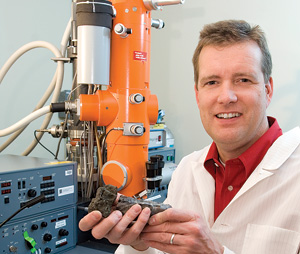Nationwide study to protect food supply

RESEARCH | K. Eric Wommack, professor of plant and soil sciences, is part of a five-year, $25 million U.S. Department of Agriculture study aimed at preventing potentially fatal illnesses linked to Shiga toxin-producing E. coli bacteria (STEC).
STEC poses a serious threat to the food supply, resulting in more than 265,000 infections in the United States each year.
The coast-to-coast study includes a team of 48 investigators from multiple universities and government agencies, with the University of Nebraska and Kansas State University as the lead institutions.
As a microbial ecologist, Wommack says he is "interested in all the microbes that make up communities of microbes." He equates this to an environmental ecologist, only instead of looking at "all the plant species within the make-up of the forest or the grassland, I look at all the microbes that comprise a microbial community."
For this study, Wommack will examine the microbial communities that form around STEC to see if scientists can pinpoint a pattern. This would allow the researchers to trace non-toxic levels of STEC by determining the kinds of microbial communities where it is most likely to occur.
"It is difficult to detect STEC when it is at the non-poisonous levels, but it is still there and so my work may show that there are other microbes that just happen to occur alongside STEC but are a whole lot easier to find," he says. "Knowing and understanding more about the biology and the ecology of the organism will ultimately help us to control its incidence in the food supply."





